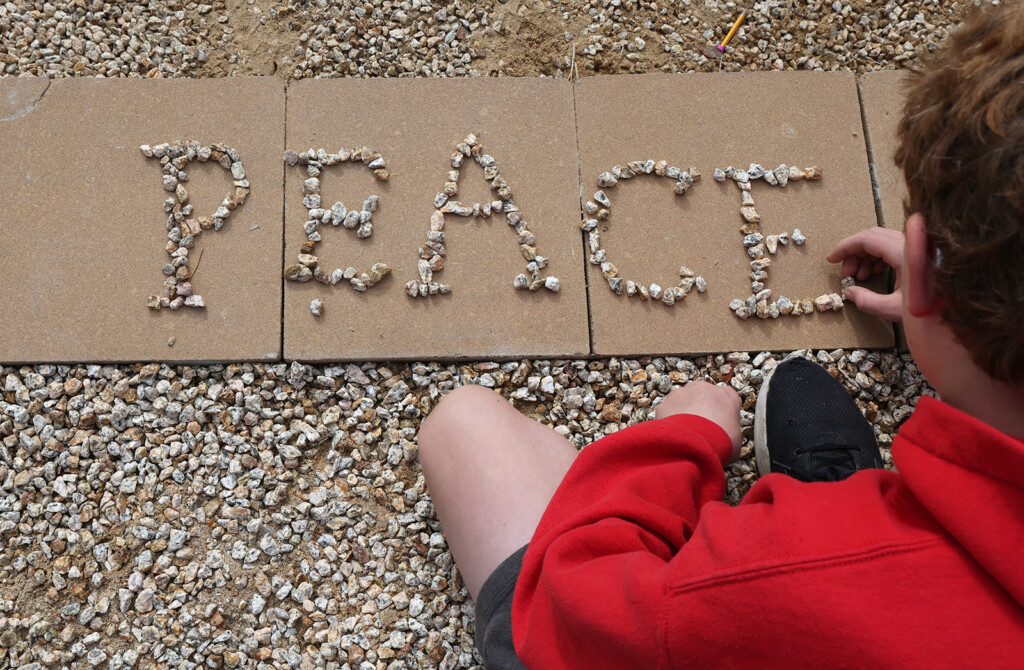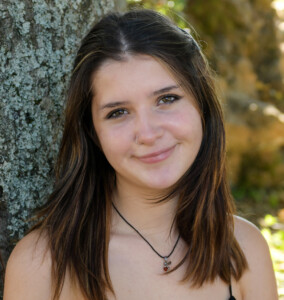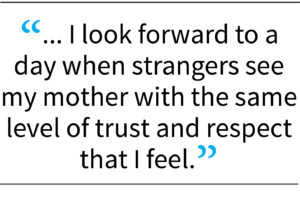Guest Column … with Irulan Faith: Mt. Madonna student says ending racism could make peace a reality
Focusing on ways to end racism is an essential endeavor.

A student uses rocks to spell out the word “PEACE” during Mt. Madonna’s commemoration of the International Day of Peace, Sept. 21. Photo by Shmuel Thaler
By Irulan Faith

Irulan Faith
Mount Madonna School commemorated its first International Day of Peace Sept. 21. Promoting peace and harmony within communities, people and the world is something that has been part of the school since its founding in 1979.
The school works deeply toward creating a safe environment where students are able to express themselves willingly and listen generously to others, free of judgment. For this event, students, faculty and guests gathered around the outdoor amphitheater to honor this year’s event theme of “End Racism, Build Peace.”
The ceremony opened with a land acknowledgment read by senior student Zoey Ocampo-Sobkoviak. Its purpose was to give respect and credit to the Native Americans who once lived on the land where Mount Madonna School is built.
Among several well-spoken guests, my classmate, junior Cy Harris, addressed the theme and its significance.
“Racism drives a wedge between people in society, and it threatens the unity of humankind,” Harris said. “Racism creates so much violence that to build peace requires that we end racism.”
One special guest, Dr. Faris Sabbah, the Santa Cruz County superintendent of schools, shared personal remarks on his youth and growing up in Iraq during the Iraq-Iran war. His story made it clear how peace is important to embrace.
Focusing on ways to end racism is an essential endeavor. Participating in Mount Madonna’s International Day of Peace is just one way to come together, acknowledge that it exists, and discuss meaningful ways to end it. Racism heavily affects and impacts individuals and communities everywhere.
 I have felt the effects of racism within my own family. I am the product of a mixed-race union where my mother is Hispanic and my father is white. As it turns out, I present as a white person and have benefited first hand from the privileges that come with my skin color.
I have felt the effects of racism within my own family. I am the product of a mixed-race union where my mother is Hispanic and my father is white. As it turns out, I present as a white person and have benefited first hand from the privileges that come with my skin color.
My mother, born and raised in El Salvador, has had a very different experience. She fled the Central American country to come to the United States due to the severity of the civil war. My parents tell stories about my mother when I was a baby.
People wondered out loud if she was the maid or the babysitter, never believing that she could be my mother. Then there are the stares that she receives walking into a room with people who realize too late that my mother is a Latina, or even that I speak fluent Spanish.
My mother fully embraces being Salvadorean. She has never tried to hide her culture in the way she raised me and my sister.
I am grateful that my mother is from El Salvador. It has become a sacred place for me because it is my mother’s homeland and, therefore, part of my own identity. I visit every year and wish more people could see the beauty that lies in different people and places.
In public, I see and feel the conditional differences applied to me and my mother simply due to the color differences in our skin. It’s sad because my mother and I are complete equals, and I look forward to a day when strangers see my mother with the same level of trust and respect that I feel. It is clear to me that ending racism would make international peace a reality.
Irulan Faith is a junior at Mt. Madonna School. She wrote this column for Gilroy Life.


